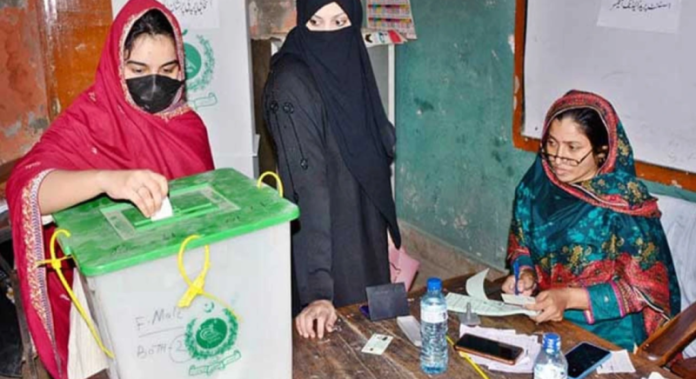ISLAMABAD, April 20, 2025: The by-election in the National Assembly constituency NA-213 Umerkot remained largely orderly and peaceful, barring sporadic instances of electoral irregularities such as illegal campaigning and canvassing. Around 43 percent of voters turned out to exercise their right to vote on polling day i.e. April 17, 2025.
The seat had fallen vacant following the death of Nawab Muhammad Yousaf Talpur, who won this constituency during General Elections 2024 on a Pakistan Peoples’ Party Parliamentarians (PPPP) ticket by securing 59 percent of the polled votes with 50 percent turnout. However, the turnout in the recent by-election declined by seven percentage points to 43 percent. The number of invalid votes also decreased, dropping from 17,571 (six percent of the polled votes) during GE-2024 to 10,071 (four percent) in the by-election. The vote share of the winner party PPPP, increased from 59 percent in GE-2024 to 62 percent in the by-election, while the vote share of the independent candidate Lalchand Pirbhumal rose from 13 percent in GE-2024 to 31 percent in the by-election. In GE-2024, the runner-up party was the Pakistan Muslim League Nawaz (PML-N), which secured 15 percent of the total polled votes. During GE-2024, three candidates secured more than 10 percent of total polled votes while by-election turned out to be a two-way race between PPPP’s Saba Talpur and independent candidate Lalchand Pirbhumal.
FAFEN deployed 10 trained observers – all male – to observe the polling day processes at 40 (eight percent of the total) polling stations established across the constituency. This report is based on the observations gathered from 24 observed polling stations.
FAFEN observers reported the presence of the candidates’ camps in the close vicinity of the nine of the 24 observed polling stations, with banners displayed and voter chits and food being distributed. Moreover, candidate-supported vehicles were seen providing transportation to voters at 14 of the 24 observed polling stations. Similarly, the men with armed were observed at five polling stations during the observation.
The majority of the polling staff deployed during the by-poll reported receiving training from the Election Commission of Pakistan (ECP). However, one Presiding Officer (PrO), six Polling Officers (POs), and seven Assistant Presiding Officers (APOs) stated that they had not attended any such refresher training prior to their deployment. Similarly, the security staff stationed at the entrances of nine polling stations indicated that they had not received any training for election duty, neither from the ECP nor from their department.
During the observation, FAFEN observers interviewed 41 polling agents representing six contesting candidates. The majority of the polling agents representing both winner and runner-up expressed satisfaction with the polling process and told they had signed the Statement Regarding Inspection of Ballot Boxes Before Start of Poll (Form-42) at their respective polling stations. The environment inside all observed polling stations was reported as conducive for voting. However, at six of the 74 polling booths of 27 observed polling stations, the placement of secrecy screens was such that it could have potentially compromised the secrecy of voters’ choices.
Assistant Presiding Officer sand Polling Officers at the majority of the observed booths were found to be fulfilling their responsibilities of issuing ballot papers and verifying voter credentials. However, five voters were turned away without being able to cast their votes due to reasons such as lacking an original NIC, presenting an expired NIC, or their votes not being registered at that polling station. Legally, voters with expired NIC are allowed to cast their ballots.
At 18 of the 24 observed polling stations, adequate seating arrangements were provided for elderly, sick, and disabled voters. FAFEN observers reported the presence of voters with disabilities at four polling stations, transgender voters at one polling station, and pregnant women at six polling stations. The polling staff prioritized assistance for the voters with disabilities, transgender persons, and elderly voters. The Election Commission of Pakistan (ECP) instructs that all such individuals should be given priority to cast their votes throughout the polling process at each polling station. However, seven out 24 the observed polling stations were found without ramps for voters using wheelchairs.
FAFEN observed the counting processes at five polling stations. The counting at observed polling stations was generally conducted in a conducive and transparent manner where counting process was visible to all present polling agents at the polling station. At the five observed polling stations, the PrOs provided copies of the Result of the Count (Form-45) to all polling agents present. Copies of the Ballot Paper Account (Form-46) were provided at four out of the five polling stations. FAFEN observers received a copy of Form-45 at all observed polling stations and a copy of Form-46 at four of the five observed polling stations.
A total of 18 candidates contested the by-election including a female candidate who won the election. Lal Chand Pirbhumal contested as an independent candidate, but he was backed by opposition parties. Similarly, Lal Chand Merumal represented the Muttahida Qaumi Movement-Pakistan (MQM-P), while Pir Muhammad Umar Jam contested on the ticket of Tehreek-e-Labbaik Pakistan (TLP). All other candidates ran independently.
The Election Commission of Pakistan (ECP) had established 498 polling stations — 98 for males, 98 for females, and 302 combined — comprising 1,816 polling booths (944 for males and 872 for females) to accommodate 608,997 registered voters, including 321,686 males and 287,311 females in the constituency.



